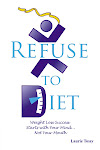So many times when we are trying to shed a few (or more than a few) extra pounds, we stumble because we don't feel full. Or even if "full" we aren't feeling satisfied.
One of the reasons for that is typically a "dieter" will not eat enough fat. Sounds funny, but it is important to eat some fat, of the right kind, if you want to lose fat--especially long term.
A brand new 2008 study supports this--but goes into more detail about the types of fats we need to ingest to feel that fuller, satisfied feeling. It is important to take omega-3 fatty acid supplements. This is true whether you want to lose a little weight or are morbidly obese.
I find this especially interesting as women in particular have targeted low-fat eating as the idea, when for a woman's chemistry, she actually needs proportionately more fat than a man does to maintain ideal health.
This study documents that the omega-2 fatty acids help control hunger "signals"...hmmm, I think that could also be cravings perhaps? And lasts at least two hours after the meal is eaten, so it isn't just the immediate post-dining sense of fullness.
How do you know that you are getting enough fat, and the right kind...in the study they suggest at least 1,300 mg per day. Where do you get it--well you could eat a lot of fish. But make sure it is wild caught. Were the waters where it was caught clean? And what if you don't want to eat that much fish? You could go with canned. Still have the clean water question, and I had a friend who got mercury poisoning from eating too much canned tuna!
So if eating enough fish is too challenging--which for me it is, and I actually LIKE fish, but I live in Colorado...not known for oceans...try supplements. I caution about supplements because they currently are not regulated. There are some good ones out there, but a lot of them could be ify at best.
So I consulted with a friend of mine, Dr. Linda Larson about what supplements to use. She gave me a great education on supplements and how they should be tested for efficacy, safety, consistency and quality. Most companies don't do that, she told me.
Stay tuned to hear the recommendations made by Dr. Linda Larson--because I'm going to share them tomorrow!
(study reference: Parra, Ramel Bandarra, Kiely, Martinez, Thorsdottir, June 14, 2008)
Friday, August 15, 2008
Subscribe to:
Post Comments (Atom)




No comments:
Post a Comment